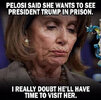B
baklavatsky
Guest
The father of Nancy Pelosi was backing Truman and FDR support of Israel.
http://www.jewishjournal.com/home/preview.php?id=17545Pelosi's father bucked FDR and Truman to aid Jews and Israel
By Rafael Medoff, Jerusalem Post
2007-04-20
(photo: Thomas D'Alesandro Jr., above left, is sworn in as mayor of Baltimore in 1947, while 7-year-old Nancy holds the Bible.)
When Nancy Pelosi, the speaker of the U.S. House of Representatives, stepped to the podium at a Knesset dinner during her visit to Israel earlier this month, she made history in more ways than one.
Not only was she the first woman House speaker to address Israel's lawmakers, Rep. Pelosi (D-San Francisco) was also addressing the parliament of a country whose creation her own father championed at the risk of his career -- and perhaps her career, as well.
Pelosi's father, the late Rep. Thomas D'Alesandro Jr. of Maryland, was known as a Roosevelt Democrat. What is not widely known is that D'Alesandro broke ranks with President Franklin D. Roosevelt on the issues of rescuing Jews from Hitler and creating a Jewish state.
D'Alesandro was one of the congressional supporters of the Bergson Group, a maverick Jewish political action committee that challenged the Roosevelt administration's policies on the Jewish refugee issue during the Holocaust and later lobbied against British control of Palestine.
The Bergson activists used unconventional tactics to draw attention to the plight of Europe's Jews, including staging theatrical pageants, organizing a march by 400 rabbis to the White House and placing more than 200 full-page advertisements in newspapers around the country.
Some of those ads featured lists of celebrities, prominent intellectuals and members of Congress who supported the group -- including D'Alesandro.
D'Alesandro's involvement with the Bergson Group was remarkable because he was a Democrat who was choosing to support a group that was publicly challenging a Democratic president.
D'Alesandro also was not one of the conservative Southern Dixiecrats who sometimes tangled with FDR over various issues. He was a staunch supporter of Roosevelt and the New Deal. He even named his first son Franklin Roosevelt D'Alesandro.
Until late in the Holocaust, the Roosevelt administration's position was that nothing could be done to rescue Jews from the Nazis except to win the war. The Bergson Group was convinced that there were many steps the United States could take to rescue refugees without impeding the war effort.
Bergson's strategy for changing U.S. policy was anchored in the hope that humanitarian-minded Democrats like D'Alesandro would break ranks with the White House over the plight of the Jews. Rallying Congress was a way to put pressure on the president.
The Bergson Group's Holocaust campaign culminated in the introduction of a congressional resolution in late 1943 urging creation of a government agency to rescue refugees. Sen. Tom Connally (D-Texas), a loyal FDR supporter and chair of the Senate Foreign Relations Committee, blocked the committee's consideration of the resolution.
However, when Connally was out sick one day, his replacement, Sen. Elbert Thomas (D-Utah), quickly ushered the resolution through. In the House, too, there was growing support for the rescue resolution.
The congressional pressure helped influence Roosevelt to do what the resolution urged -- in early 1944, he established the War Refugee Board. Despite its small staff and meager funding, the board played a key role in the rescue of more than 200,000 Jews from the Holocaust. Its many accomplishments included sponsoring the heroic life-saving activities of Swedish diplomat Raoul Wallenberg in Nazi-occupied Budapest.
After the war, D'Alesandro continued supporting the Bergson Group as it campaigned for the establishment of a Jewish state in Palestine. That sometimes meant clashing with the Truman administration, which wavered back and forth on the issue of Jewish statehood.
Every member of Congress who supported the Bergson Group had his own particular reasons for doing so. Thomas, for example, was a Mormon, and his kinship with the Jewish people had been forged by both his community's experiences as a mistreated minority and his religious convictions about the Jews and the Holy Land. Rep. Andrew Somers (D-N.Y.) was of Irish descent, and his resentment of British rule in Ireland strengthened his support for the Bergson Group's campaigns against the British shutdown of Palestine to Jewish refugees. Another important Bergson supporter, Rep. Will Rogers Jr. (D-Calif.), son of the famous entertainer, was part Native American, and he attributed his interest in the plight of the Jews to his general concern for minorities.
D'Alesandro was a Catholic and the son of Italian immigrants. Perhaps those factors fueled his sympathy for religious minorities and refugees. Or perhaps it was just the simple humanitarian instinct of every sensitive person who hears of innocents being persecuted and wants to help, regardless of political considerations.
Whatever his motives, D'Alesandro was taking a big risk. He knew that by defying Roosevelt and Truman, he might be making enemies in the White House. In 1947, at the very moment he was breaking ranks with Truman over Palestine, D'Alesandro decided to run for mayor of Baltimore. If the White House had chosen to retaliate against him for his dissent on Palestine, he might never have been elected. If that had happened, his daughter, Nancy, might never have embarked on a political career of her own.
(...)
Rafael Medoff is director of the David S. Wyman Institute for Holocaust Studies.



